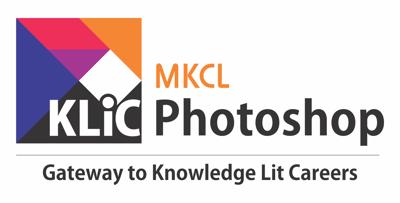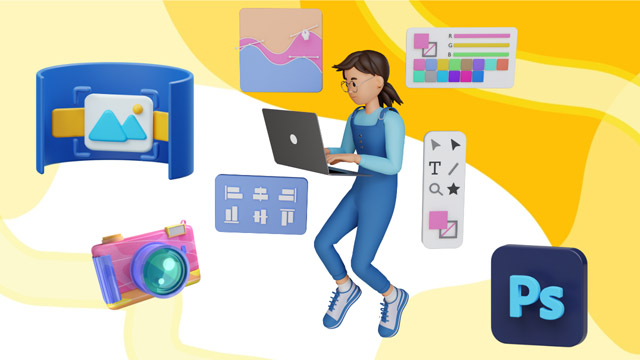- Classify and familiarize with popular photo editing software and tools.
- Explain techniques for improving image quality, including adjustments to brightness, contrast, and saturation.
- Demonstrate cropping and resizing images for better composition and varied purposes.
- Describe color correction and compare color grading methods for specific moods in images.
- Explain exposure adjustments, considering elements like brightness, shadows, highlights, and contrast.
- Distinguish between creative effects, experimenting with different styles.
- Interpret real-world editing projects for hands-on practice.
- Examine user interactions to enhance website usability.
- Define the importance of ethical practices and honest representation in photo editing.
- Analyze critical aspects of images, explaining visual aesthetics and composition principles.

Picture Perfect Edits
Edit and enhance photos using tools for retouching, filters, and creative effects.
Introduction
What you'll learn ?
- Demonstrate advanced proficiency in widely used photo editing software.
- Analyze interfaces, tools, and menus to streamline efficient editing tasks for optimal workflow.
- Apply advanced techniques for enhancing image quality, including adjustments to brightness, contrast, and saturation.
- Execute proficient cropping techniques to enhance composition and visual impact.
- Comprehend exposure adjustments, covering elements like brightness, shadows, highlights, and contrast.
- Balance tonal ranges for optimal visual impact, creating captivating visuals.
- Uphold ethical standards, ensuring honest representation in edits.
- Demonstrate self-awareness in the editing process through critical evaluation.
- Report practical application of editing techniques in real-world scenarios, sharing insights.
- Recognize and illustrate the effective usage of advanced photo editing tools like layers, masks, and filters.
Syllabus
- Classification of popular photo editing software (Adobe Photoshop, Lightroom, GIMP, etc.)
- Familiarization with the user interface and tools available in editing software
- Techniques for improving image quality: brightness, contrast, and saturation adjustments
- The art of cropping images for better composition
- Understanding the rule of thirds, leading lines, and framing
- Resizing images for various purposes (web, print, social media)
- Maintaining aspect ratio and resolution considerations
- Basics of colour correction: white balance, tint, and temperature adjustments
- Comparing various colour grading methods for creating specific moods and looks
- Adjusting brightness, shadows, highlights, and contrast for balanced exposure
- Applying creative effects: black and white conversion, sepia, vignettes, and experimenting with filters and textures
- Importance of ethical practices in photo editing
- Analysing critical aspects of images: visual aesthetics and composition principles
- Identification and mastery of layers, masks, and filters
- Overview of software offering these advanced features (e.g., Adobe Photoshop)
- Concepts of layers, blending modes, and stacking order
- Practical exercises on non-destructive editing with layers
- Various masking techniques, including layer masks and clipping masks, for precise editing control
- Exploring the flexibility of non-destructive editing
- Creating complex compositions using masks
- Organizing layers and masks to create cohesive digital montages and composites
- Application and comparison of artistic filters for achieving creative balance in images
- Advantages of working with RAW files for extended flexibility in post-processing
- Differentiating between various portrait retouching techniques for natural-looking results
- Strategies for handling diverse projects and summarizing approaches for a versatile portfolio
- Arranging an efficient editing workflow, addressing common editing challenges, and adopting best practices for speed and efficiency
Certificate
- MKCL provides certificate (for 30/60/90 hours courses) to the KLiC learner after his/her successful course completion.
Academic Approach
The Academic Approach of the course focuses on the “work centric” education i.e. begin with work (and not from a book !), derive knowledge from work and apply that knowledge to make the work more wholesome, useful and delightful. The ultimate objective is to empower the Learner to engage in socially useful and productive work. It aims at leading the learner to his/her rewarding career as well as development of the society.
Learning methodology
- Learners are given an overview of the course and its connection to life and work.
- Learners are then exposed to the specific tool(s) used in the course through the various real-life applications of the tool(s).
- Learners are then acquainted with the careers and the hierarchy of roles they can perform at workplaces after attaining increasing levels of mastery over the tool(s).
- Learners are then acquainted with the architecture of the tool or Tool Map so as to appreciate various parts of the tool, their functions and their inter-relations.
- Learners are then exposed to simple application development methodology by using the tool at the beginner’s level
- Learners then perform the differential skills related to the use of the tool to improve the given ready-made outputs.
- Learners are then engaged in appreciation of real-life case studies developed by the experts.
- Learners are then encouraged to proceed from appreciation to imitation of the experts.
- After imitation experience, they are required to improve the expert’s outputs so that they proceed from mere imitation to emulation.
- Finally, they develop the integral skills involving optimal methods and best practices to produce useful outputs right from scratch, publish them in their ePortfolio and thereby proceed from emulation to self-expression.
Evaluation Pattern
Evaluation Pattern of KLiC Courses consists of 4 Sections as per below table:
| Section No. | Section Name | Total Marks | Minimum Passing Marks |
|---|---|---|---|
| 1 | Learning Progression | 25 | 10 |
| 2 | Internal Assessment | 25 | 10 |
| 3 | Final Online Examination | 50 | 20 |
| Total | 100 | 40 | |
| 4 | SUPWs (Socially Useful and Productive Work in form of Assignments) | 5 Assignments | 2 Assignments to be Completed & Uploaded |
MKCL’s KLiC Certificate will be provided to the learner who will satisfy the below criteria:
- Learners who have successfully completed above mentioned 3 Sections i.e. Section 1, Section 2 and Section 3
- Additionally, learner should have completed Section 4 (i.e. Section 4 will comprise of SUPWs i.e. Socially Useful and Productive Work in form of Assignments)
- Learner has to complete and upload minimum 2 out of 5 Assignments
Courses Fee Structure from 01 July, 2025 Onwards
KLiC 60 hour course fee applicable from 01 July, 2025 all over Maharashtra| KLiC Course Duration | MFO: MKCL Share (Including 18% GST) |
ALC Share (Service Charges to be collected by ALC) |
|---|---|---|
| 60 hours | Rs. 500/- | Rs. 2,500/- |
Important Points:
* Above mentioned fee is applicable for all Modes of KLiC Courses offered at Authorised Learning Center (ALC) and at Satellite Center
* Total fee is including of Course fees, Examination fees and Certification fees
* MKCL reserves the right to modify the Fee anytime without any prior notice
* Above mentioned fee is applicable for all Modes of KLiC Courses offered at Authorised Learning Center (ALC) and at Satellite Center
* Total fee is including of Course fees, Examination fees and Certification fees
* MKCL reserves the right to modify the Fee anytime without any prior notice
KLiC Courses Fee Structure upto 30 June, 2025
| Region | Total Fee (Rupees) |
| MMRDA, PMRDA and Rest of Maharashtra | 3000/- |
Important Points:
* Above mentioned fee is applicable for all Modes of KLiC Courses offered at Authorised Learning Center (ALC) and at Satellite Center
* Total fee is including of Course fees, Examination fees and Certification fees
* MKCL reserves the right to modify the Fee anytime without any prior notice
* Above mentioned fee is applicable for all Modes of KLiC Courses offered at Authorised Learning Center (ALC) and at Satellite Center
* Total fee is including of Course fees, Examination fees and Certification fees
* MKCL reserves the right to modify the Fee anytime without any prior notice
